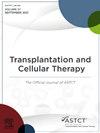A Structured Peer Support Intervention for Patients With Hematologic Malignancies Undergoing Hematopoietic Stem Cell Transplantation: Peer Support Interventionists’ Perspectives
IF 3.6
3区 医学
Q2 HEMATOLOGY
引用次数: 0
Abstract
Background
Peer support is emerging as an important component of supportive care for patients with hematologic malignancies, but it has not been robustly implemented in patients undergoing hematopoietic stem cell transplantation (HSCT).
Objectives
This qualitative study aimed to explore the experiences of peer support interventionists (participants) delivering a structured, 5-session, phone-delivered peer support intervention, the Supporting Transplant Experiences with Peer Program (STEPP) for patients undergoing HSCT.
Methods
Adult patients who underwent allogeneic or autologous HSCT for the treatment of a hematologic malignancy within the past 3 years were eligible to volunteer in this study as trained STEPP interventionists. Semi-structured qualitative interviews were conducted to explore participants’ experiences, including their motivations for volunteering, reflections on intervention delivery and on the impact of peer support, and challenges faced while serving in this role. Interviews were deductively analyzed by 2 coders using framework-guided rapid analysis.
Results
Twenty STEPP interventionists participated in this study. Participants were 65% men, with a median age of 63.5 years. Most (75%) had undergone allogeneic HSCT. Emerging themes from the qualitative interviews highlighted that participants were motivated to serve as interventionists by a sense of gratitude for their transplant care and a desire to share their transplant experiences with others. The impact of the STEPP intervention on interventionists included opportunities to process their transplant journey while also providing support to their peers. Interventionists reported a preference for free-flowing conversations, which were still guided by the structured manual. Challenges included terminating the interventionist-patient relationship at the conclusion of STEPP.
Conclusion
Peer support interventions for patients undergoing HSCT have the potential to enhance well-being and provide meaning for both patients preparing to undergo HSCT and HSCT survivors who serve as interventionists. Large-scale randomized clinical trials are needed to test the efficacy of peer support interventions for improving health-related outcomes among patients undergoing HSCT and HSCT survivors serving as interventionists for these interventions.
对接受造血干细胞移植的恶性血液病患者的结构化同伴支持干预:同伴支持干预学家的观点。
背景:同伴支持正在成为血液系统恶性肿瘤患者支持性护理的重要组成部分,但尚未在接受造血干细胞移植(HSCT)的患者中广泛实施:这项定性研究旨在探讨同伴支持干预者(参与者)在为造血干细胞移植患者提供结构化、五次会议、电话传递的同伴支持干预--同伴支持移植经验计划(STEPP)--时的经验:过去三年内接受过异体或自体造血干细胞移植治疗血液恶性肿瘤的成年患者均有资格自愿参加本研究,成为经过培训的 STEPP 参与者。研究人员进行了半结构化定性访谈,以探究参与者的经历,包括志愿服务的动机、对干预实施和同伴支持影响的反思,以及在担任这一角色时所面临的挑战。访谈由两名编码员采用框架指导下的快速分析方法进行演绎分析:20 名 STEPP 干预人员参与了此次研究。其中 65% 为男性,年龄中位数为 63.5 岁。75%的人接受过异体造血干细胞移植。定性访谈中出现的主题强调,参与者担任干预者的动机是对移植治疗的感激之情以及与他人分享移植经验的愿望。STEPP 干预措施对干预者的影响包括,他们有机会处理自己的移植历程,同时也为同伴提供支持。干预者表示他们更喜欢在结构化手册的指导下进行自由交流。面临的挑战包括在 STEPP 结束时终止干预者与患者之间的关系:对接受造血干细胞移植的患者进行同伴支持干预有可能提高患者的幸福感,并为准备接受造血干细胞移植的患者和作为干预者的造血干细胞移植幸存者提供意义。需要进行大规模的随机临床试验,以检验同伴支持干预对改善接受造血干细胞移植的患者和作为干预者的造血干细胞移植幸存者的健康相关结果的效果。
本文章由计算机程序翻译,如有差异,请以英文原文为准。
求助全文
约1分钟内获得全文
求助全文
来源期刊

Transplantation and Cellular Therapy
Medicine-Hematology
CiteScore
7.00
自引率
15.60%
发文量
1061
审稿时长
51 days
 求助内容:
求助内容: 应助结果提醒方式:
应助结果提醒方式:


